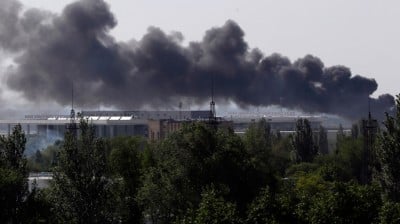New Ukraine Government Launches Airstrikes and Prepares Austerity Measures

The character of the new Ukrainian government headed by billionaire oligarch Petro Poroshenko has been quickly revealed in the day since presidential elections held over the weekend: violent repression of opposition to the regime, particularly in the east, combined with brutal austerity measures directed at the entire working class.
On Monday, warplanes launched air strikes against pro-Russian separatist forces that took control of Donetsk International Airport early Monday morning. An official in the Kiev government also confirmed that paratroops had landed near the airport, saying that they are “cleaning up the area.”
The airport was closed on Monday after the separatists invaded the terminal and demanded that the Ukrainian National Guard depart. Kiev pilots flying a Mi-24 helicopter gunship, a MiG-29 and Sukhoi Su-25 jets then carried out strafing runs, targeting anti-aircraft batteries and sending up thick plumes of black smoke.
By nightfall it remained uncertain who controlled the airport in Donetsk. Hundreds of separatist militants were reported to be camped in forested areas nearby.
Reports from sources in Donetsk indicated that gunfire at the city’s train station killed one and injured two on Monday. The AP reported that government mortar fire in Slovyansk left two more dead.
Speaking on Monday, Poroshenko promised swift prosecution of the military actions in the east, saying, “There will be a sharp increase in the efficiency of anti-terrorist operations.” He added, “Subdivisions and units have to be better equipped. They must have modern weaponry, the best ammunition.”
The military actions in the east follow sham elections aimed at giving legitimacy to a US and European backed putsch against the previous government of Victor Yanukovych. The overthrow of Yanukovych, who was closer to Russia, was spearheaded by right-wing Ukrainian nationalist and fascistic forces deeply unpopular throughout the country, and particularly in the predominantly Russian-speaking east.
Sunday’s elections were boycotted by large sections of the population, and polling stations were shut down in the east. Even so, Poroshenko, whose main competitors were other pro-Western oligarchs, barely won a majority. Some reports have placed the final vote count for Poroshenko at just more than the 50 percent required to avoid a run-off.
Poroshenko’s main task as he assumes power will be to implement the second part of an association agreement with the European Union, which includes “structural reforms” linked to a $17 billion International Monetary Fund (IMF) loan. Yanukovych’s November 2013 decision not to sign the association agreement with the EU was a principal factor behind the US and EU destabilization campaign.
The IMF loan is contingent upon the enforcement of deep cuts to crucial gas subsidies depended upon by millions of Ukrainians. These cuts will increase energy prices by as much as 425 percent during the next few years.
Other anti-working class measures built into the loan include a currency devaluation and bailouts for the country’s major banks. These deeply unpopular measures were deliberately delayed until after the elections.
The loaned funds will go directly to Ukraine’s most powerful private sector creditors, mainly European banks, and to well-connected sections of Ukrainian capital, while Ukrainian workers will pay the price in the form of wage cutting, privatization of services, mass layoffs and spending cuts.
Poroshenko has made clear that the ongoing military operations in the east, which have included use of heavy weaponry in densely populated areas, are intended to smash opposition to this economic agenda.
“I assure you, as soon as we’ll achieve stability in the east and these problems in Ukraine will be solved, the investment boom will immediately begin,” then-presidential candidate Poroshenko said at a May 18 press conference.
Poroshenko has indicated that he will supplement military operations against the separatists with diplomatic efforts seeking a rapprochement with Russian President Vladimir Putin. Intensive talks with Putin are being scheduled for early July, the new president revealed at a press conference Monday.
“Because Mr. Putin and I know each other quite well, I think this will lead to very important results.” said Poroshenko, who has had business dealings in Russia.
For his part, Putin, despite the remaining geopolitical conflicts with the US and Europe, has indicated a desire to reach accommodation with the new government, an agreement that will be based on an intensified assault on the working class throughout Ukraine. Russia has already said it recognizes the elections and the new government.

